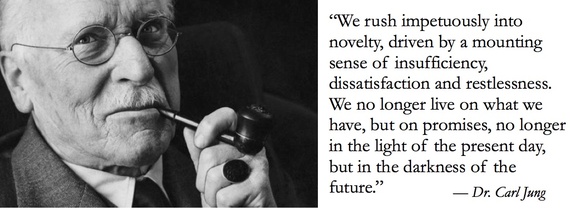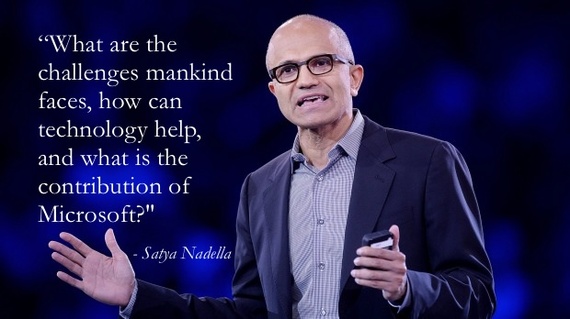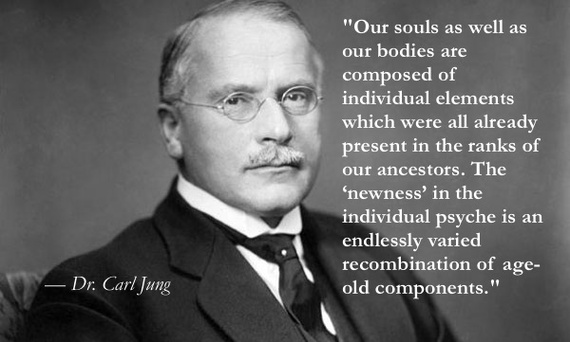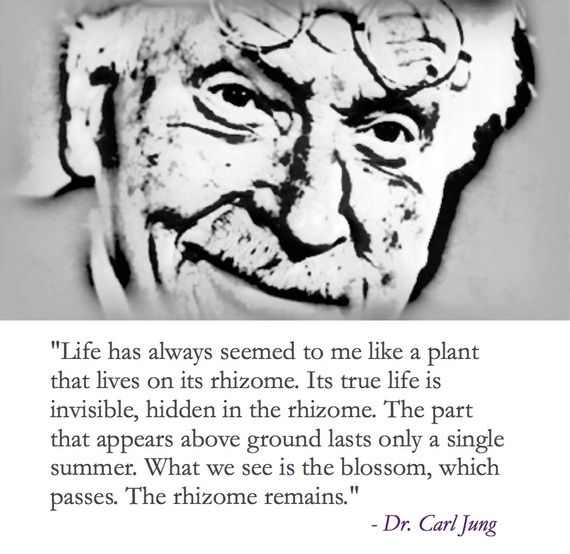Tech in the 21st century fragments rather than integrates. It allows us to pack more "stuff" into every hour. But the technology that's supposed to make life easier actually makes it harder to enjoy.
We often feel distracted. We rarely feel whole. And nobody says anything about what's missing because being fragmented has become the norm.
What's up with that?
When Satya Nadella started as CEO in 2014, he suggested that Microsoft would focus on human impact not just how innovation can drive the bottom line.
"Our customers and society expect us to maximize the value of technology while also preserving the values that are timeless... We will strike the right balance ... using data to create intelligent, personal experiences ..."
Since then, Microsoft has begun to focus on "inclusive design." In December 2015, it launched a new iteration of its philanthropy - Microsoft Philanthropies -- aimed as "empowering everyone and every organization on the planet."
Mr. Nadella asks:
Well, here's a challenge for you, Mr. Nadella. I call it spiritual impairment, and billions of tech users experience it every day.
By spiritual, I don't refer to any particular religion or faith, but rather the innate human ability to use our attention to integrate heart, mind, body and intuition, and in so doing, to find well-being and equanimity.
Our spiritual integrity gives us the opportunity to transcend difficulties. But we lose touch with this natural resilience because society teaches us that we are fragmented and distracted not whole and aware. So we learn to define ourselves by what we think we can't do. Tech, for all its wondrous magic, often exacerbates the situation by emphasizing what machines can do for us rather than how we can find wholeness in our own bodies and spirits.
We do need timeless values. And the need is urgent. Look around you. The sense of brokenness is spreading and infecting communities and cultures. Our national politics demonstrate how easily this thinking leads to dysfunction, delusion and even hatred.
This is scary stuff. How can we respond?
Well, what if the tech world set out to empower core practices for individual and collective integrity? Things like:
- Honoring our ancestors
- Finding daily balance in nature
- Practicing mindfulness (prayer, meditation, yoga, whatever works) so we can be aware and compassionate in the present
All these things create paths to the timeless values of respect, tolerance and joy - key elements to human wholeness.
I am grateful to Satya Nadella and the Microsoft team for their leadership. But as they investigate inclusive design, I would challenge them to create products that support human wholeness. I would challenge them to create technology that encourages reflection, forgiveness and, yes, love.
And if this sounds impossible, please remember that impossible tasks often present the most promising avenues for change because they invite us to think beyond our expectations.
To inspire new thinking, I offer this passage from Memories, Dreams, Reflections by Dr. Carl Gustav Jung, a man who revolutionized psychology by putting the whole human being at the center of his treatment.
"We have plunged down a cataract of progress which sweeps us on into the future with ever wilder violence the farther it takes us from our roots.
"Once the past has been breached, it is usually annihilated, and there is no stopping the forward motion. But it is precisely the loss of connection with the past, our uprootedness, which has given rise to the 'discontents' of civilization and to such a flurry and haste that we live more in the future and its chimerical promises of a golden age than in the present, with which our whole evolutionary background has not yet caught up.
"We rush impetuously into novelty, driven by a mounting sense of insufficiency, dissatisfaction and restlessness. We no longer live on what we have, but on promises, no longer in the light of the present day, but in the darkness of the future, which, we expect, will at last bring the proper sunrise."We refuse to recognize that everything better is purchased at the price of something worse ... The less we understand of what our fathers and forefathers sought, the less we understand ourselves, and thus we help with all our might to rob the individual of his roots and his guiding instincts, so that he becomes a particle in the mass, ruled only by what Nietzche calls the spirit of gravity.
"Reforms by advances, that is, by new methods or gadgets, are of course impressive at first, but in the long run they are dubious and in any case dearly paid for. They by no means increase the contentment or happiness of people on the whole. Mostly, they are deceptive sweetenings of existence, like speedier communications which unpleasantly accelerate the tempo of life and leave us with less time than ever before. Omnis festinatio ex parte diaboli est - 'all haste is of the devil,' as the old masters used to say." - Dr. Carl Jung
Dr. Jung's insightful - and unstinting - criticism is not the end of the story, however.
His sting can become our impetus. For tech represents the most plastic and potent force in our society.
Why can't technology help us to enrich the human spirit? Isn't it just a matter of will and design, inspiration and application? Why can't innovation help us find a new balance for a new age?
The key is understanding that success doesn't mean breaking with our roots, but engaging with them.
According to Dr. Jung, humans find wholeness by bringing opposites into balance - the finite and temporal qualities of the self welcoming the infinite and eternal qualities of the unconscious. What if the wizardry of tech could help us all maintain this vital and dynamic balance?
The software that can help us embody love, joy and compassion in our everyday lives - is this not the most important code that could be written this century?
Microsoft, is this not a worthy challenge?
I leave the last words to Dr. Jung:
"The decisive question for man is: Is he related to something infinite or not? That is the telling question of his life. Only if we know that the thing which truly matters is the infinite can we avoid fixing our interest upon futilities, and upon all kinds of goals which are not of real importance ... If we understand and feel that here in this life we already have a link with the infinite, desires and attitudes change. In the final analysis, we count for something only because of the essential we embody, and if we do not embody that, life is wasted."




